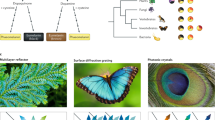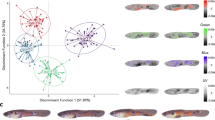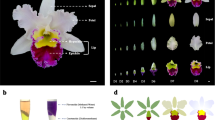Abstract
IN a letter published in NATURE of June 27, 1931, Miss Scott Moncrieff mentions an interesting case of flower-colour inheritance in Pelargonium. On selling, a rose-pink variety gave seventeen offspring like itself and three others producing salmon-pink flowers. The rose-pink petals contained the anthocyanin pigments, cyanin and pelargonin (the latter only as a trace); the salmon-pink petals, pelargonin only. That is, the dominant factor in colour inheritance causes cyanin to be formed almost entirely instead of pelargonin. This factor, therefore, as pointed out by Miss Scott Moncrieff, brings about the insertion of a hydroxyl group in the phenyl ring, which process may be regarded as one of oxidation.
This is a preview of subscription content, access via your institution
Access options
Subscribe to this journal
Receive 51 print issues and online access
$199.00 per year
only $3.90 per issue
Buy this article
- Purchase on Springer Link
- Instant access to full article PDF
Prices may be subject to local taxes which are calculated during checkout
Similar content being viewed by others
Author information
Authors and Affiliations
Rights and permissions
About this article
Cite this article
ONSLOW, M. Chemical Effect of a Mendelian Factor for Flower Colour. Nature 128, 373–374 (1931). https://doi.org/10.1038/128373b0
Issue Date:
DOI: https://doi.org/10.1038/128373b0
This article is cited by
-
Theories of the biogenesis of flavonoid compounds (Part II)
The Botanical Review (1952)
-
The anthocyanin pigments of plants
The Botanical Review (1947)
-
Die genetischen Grundlagen der Blütenfarben
Zeitschrift für Induktive Abstammungs- und Vererbungslehre (1938)
-
Contributions to the genetics of the China aster
Genetica (1937)
-
A biochemical survey of some mendelian factors for flower colour
Journal of Genetics (1936)
Comments
By submitting a comment you agree to abide by our Terms and Community Guidelines. If you find something abusive or that does not comply with our terms or guidelines please flag it as inappropriate.



